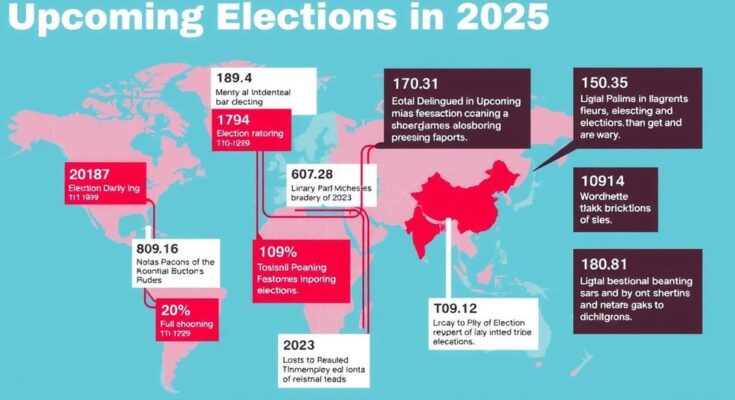Five critical elections will take place in 2025, significantly influenced by ongoing themes like inflation, populism, and geopolitical tensions. Belarus will maintain its authoritarian leadership under Lukashenko, while Germany faces a coalition shift. The Philippines has key midterm elections that may impact political dynamics with potential Duterte impeachment scenarios. Canada anticipates a significant election that may shift toward conservatism, while Chile’s election could mark a right-wing resurgence amidst social concerns.
The coming year, while not as eventful as the 2024 electoral calendar, features five notable elections of great significance. These elections, taking place in Belarus, Germany, the Philippines, Canada, and Chile, are largely driven by ongoing themes, such as inflation, rising populism, and geopolitical tensions stemming from conflicts in Europe and the Middle East. Each election offers crucial insights into the political dynamics of these nations, influenced by both internal and external pressures.
In Belarus, President Alexander Lukashenko, the longest-serving leader in Europe, will seek re-election on January 26, 2025. Despite no credible opposition, the election raises concerns about the integrity of the electoral process. Furthermore, Lukashenko’s potential victory may solidify Belarus’s alignment with Russia, particularly in light of recent geopolitical events.
Germany’s elections, set for February 23, 2025, follow a tumultuous collapse of the coalition government, leading to early elections. As Chancellor Olaf Scholz grapples with low approval ratings and rising economic challenges, a reshaping of Germany’s political landscape seems imminent. The election will be pivotal amidst pressing issues such as the economic recession and tense international relations.
On May 12, 2025, the Philippines will conduct midterm elections for senators and local officials. President Ferdinand Marcos Jr. will likely use these elections to consolidate power amidst political rivalries. The outcome could impact key issues like potential impeachment proceedings against Vice President Sara Duterte, highlighting the intricate dynamics within Philippine politics.
In Canada, an election is anticipated before October 20, as Prime Minister Justin Trudeau faces mounting pressures and declining poll numbers. The potential departure from the current coalition could usher in a conservative shift under Pierre Poilievre’s leadership, challenging Trudeau’s progressive agenda and changing Canada’s political identity.
Lastly, Chile’s presidential election on November 16, 2025, may see a right-wing coalition regain power after recent political rejections of constitutional texts. The ruling coalition has struggled to present a strong candidate against Evelyn Matthei, while rising crime rates and public concerns will likely shape voter sentiment.
These elections in Belarus, Germany, the Philippines, Canada, and Chile will be critical not only for their respective nations but also for the global political landscape as ongoing themes of inflation, populism, and national identity take center stage.
The anticipated elections in 2025 occur within a broader context of global political shifts, wherein countries are addressing the consequences of economic instability, social unrest, and geopolitical conflicts. Notably, the rise of populism is a recurring theme among various nations grappling with discontent among citizens due to inflation and economic challenges. These elections could redefine national policies as leaders respond to evolving public sentiment and external pressures. In particular, these elections signify a pivotal moment for nations such as Belarus, Germany, the Philippines, Canada, and Chile, each grappling with local complexities. The outcomes of these elections may influence not only domestic policies but also international relations and alignments going forward, making them worth observing closely.
In summary, the elections in Belarus, Germany, the Philippines, Canada, and Chile from 2025 will serve as significant barometers for the political climate in each nation. With ongoing global issues shaping voter priorities, these elections will reflect the struggles and aspirations of citizens amidst inflationary pressures and shifting political landscapes. Ultimately, the results may have lasting implications for the respective countries as they navigate the complexities of governance in the current geopolitical environment.
Original Source: theconversation.com




